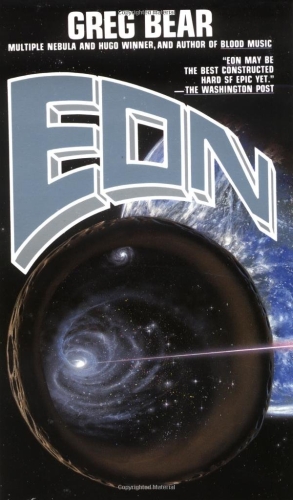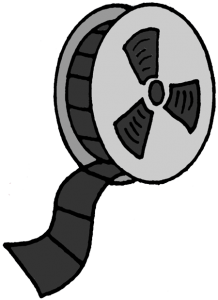
|
| Cover art by Ron Miller |

Film This!

|
| Cover art by Ron Miller |

| EON Greg Bear New York: TOR, October 1991 (7th printing) |
Rating: 5.0 High |
|||
| ISBN-13: 978-0-812-53174-9 | ||||
| ISBN-10: 0-812-53174-4 | 504pp. | SC | $3.95 | |
Eon is a tale full of fascination and foreboding. Imagine, if you will, a scenario like this: An asteroid 300 km long appears near Earth. It maneuvers into an orbit looping around Earth and Moon in succession, then is quiescent. On Earth, rival superpowers mount expeditions to investigate. America, with its leadership in technology, gets inside first and establishes a dominant position. But the USSR and China are not far behind.
Inside, the explorers find a series of seven chambers, connected by gaps at the center of the rotating body. There is air near the outer surface, which is mostly rock and soil, and there are lakes, rivers, forests, and grasslands. The first four chambers hold wonders: cities of odd design, but built by humans, and with everything in working order. Volumes in the libraries recount a history very much like Earth's, even including the Cold War. That is where the foreboding comes in: for in this history the Cold War turned red-hot.
| Page 20 | By comparison, the Little Death of 1993 was a low-technology boondoggle. A minor contretemps causing embarrassment as much as horror, it resulted in an insincere national resolve that resembled the mocking pretenses of young children. Afraid of their weapons, during that first conflict the Western bloc and Soviet forces constantly "pulled their punches," relying on the tactics and technology of past decades. When the engagements became nuclear—as all in command knew in their hearts they would—the space-based defense systems, still young and unproven, showed themselves to be remarkably effective. They could not, however, stop the near-shore submarine launches of the three missiles which destroyed Atlanta, Brighton, and part of the coast of Brittany. The Russians could not protect their city of Kiev. The nuclear exchange was limited, and the Soviets and western bloc countries capitulated almost simultaneously. But the rehearsal had already been conducted, and the Soviets had emerged with less "hits" than their adversaries. They had gained nothing but a deadly resolve: that they would not be defeated under any circumstances, nor would history overtake their outmoded system. The Death, when it came, was completely earnest and open. Every weapon was used as it had been designed to be used. There seemed to be no compunction about consequences. |
| Page 3 | The Little Death resulted in 4 million casualties, most in Western Europe and England. The Death resulted in 2½ billion casualties, and the numbers will always be uncertain, for by the time the body counts were "completed," it is possible that as many bodies had rotted as had been counted. And, of course, as many more had been completely vaporized. |
These passages come from an encyclopedia found in the second-chamber library: the one with books.1 (They are quoted on pages 103 & 104 of Eon.) Painful as the prospect of all-out nuclear war may be to us, its impact was far worse in the world of Bear's story, where the Little Death had already happened. Indeed, by the dates in the alternate history the Americans found, the Death was due in less than two months. The big questions were: how likely was their own history to follow the alternate one, and what could they do to improve the odds of preventing disaster?
As the entries from the Stone's2 encyclopedia suggest, the Russians in this tale are not cooperative. Ultimately, frustrated at being locked out of access to the libraries and other discoveries, they mount a partly successful attack on the Stone. Some break through to the fourth chamber and, stalemated there, set up camps well away from the American settlements. An uneasy truce develops.
Meanwhile, building on their more that two-years head start, the Americans and allies continue probing the Stone's secrets. Bypassing the fifth chamber, which is mostly undeveloped, and the sixth chamber with its immense constructs of indecipherable purpose, they concentrate on the seventh. Well they might, for this chamber seems to have no end. American teams have already traveled some 700 km along its tubelike extent, using surface vehicles. They've found more of the same conditions: fertile soil with plant life, and occasional structures in good repair. Yet in all that territory not one definite sign of original inhabitants has appeared — except that a few have reported strange creatures visible one moment, gone the next. Officially, these are called "boojums" and ascribed to overwork or nerves. It is not an unreasonable conclusion.
But the boojums presently turn out to be all too apparent.
In Eon, Greg Bear has woven a very inventive and compelling tale. Its politics are plausible. It describes the mind-boggling technologies of Thistledown with the bare minimum of detail necessary, and so keeps the action moving. It has a coherent plot and well-developed characters. It also works as allegory and inspiration; allegory because of the resemblance between the Stoners' politics and our own,3 and inspiration because it portrays a future society which empowers individuals to follow where their desire and their talent lead them, without coercion or violence. Coercion and violence exist in this society; it is not perfect. But the society's watchwords are respect for individuality and diversity; transgressions are dealt with harshly. Greg Bear's novel earns top marks, and it is definitely a keeper.

 To contact Chris Winter, send email to this address.
To contact Chris Winter, send email to this address.